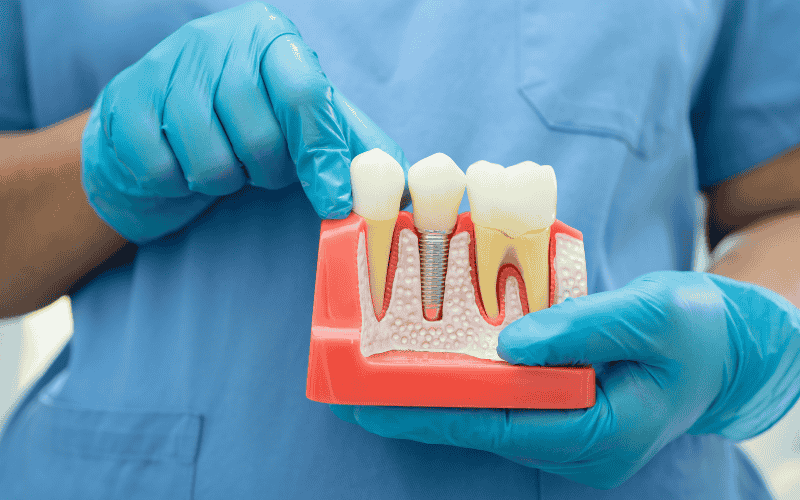Dental implants provide a structured, long-term solution for replacing missing teeth. Each implant consists of a titanium post, an abutment, and a custom crown that replicates the appearance and function of a natural tooth. By restoring stability and comfort, implants enhance oral health and offer a durable, lasting replacement option. Here’s more information about the long-term advantages of dental implants:
Maintaining Jawbone Integrity
A primary long-term advantage of dental implants is their ability to preserve jawbone integrity. Natural tooth roots transfer chewing forces to the jaw, stimulating bone tissue and maintaining its density. When teeth are missing, the bone loses stimulation and begins to resorb, gradually reducing volume. Implants resolve this by transmitting similar forces through the titanium post during normal function. They protect bone structure and support natural facial contours; this helps sustain long-term oral stability and appearance.
Offering a Durable Solution
Durability and stability are among the primary advantages of dental implants. The titanium post integrates with the jawbone through osseointegration, creating a secure, long-lasting foundation. Unlike removable dentures, implants remain fixed. They prevent movement or shifting during speaking, chewing, or other daily activities.
High-strength ceramic crowns and advanced materials enhance durability and resist wear. They help maintain both function and appearance over time. Implants promote an aesthetic smile, and they provide reliable support for biting and chewing, increasing dietary options.
Preserving Adjacent Natural Teeth
Preserving healthy teeth is a fundamental goal when evaluating tooth replacement options. Some traditional bridges require reshaping neighboring teeth to anchor the restoration, and this can weaken enamel over time. Dental implants are independent units placed directly into the jaw at the site of the missing tooth. This approach leaves adjacent teeth structurally intact and supports natural alignment within the dental arch. It maintains overall chewing efficiency and comfort, and it may minimize the need for additional restorative work in the future. By preserving healthy enamel, dental implants help sustain long-term oral function and stability, promoting a balanced, lasting foundation for surrounding teeth.
Facilitating Oral Hygiene
Effective oral hygiene is fundamental to the long-term success of any dental restoration. Single-tooth implants integrate seamlessly with regular brushing and flossing, functioning like natural teeth. There is no need for complex cleaning routines or specialized tools beyond standard oral care. This simplicity allows individuals to manage plaque effectively, maintain healthy gums, and support both the longevity of the implant and the wellness of surrounding tissues.
Consistent daily hygiene is also key to protecting the implant site from complications. By lowering the risk of peri-implant disease and supporting overall oral health, routine care promotes proper implant function. It safeguards adjacent teeth and gums, and it contributes to the restoration’s durability while promoting long-term comfort.
Inquire About Dental Implants
Implants offer multiple long-term benefits, including preserving jawbone integrity, protecting neighboring teeth, and supporting routine oral hygiene. These features make implants an ideal choice for individuals seeking tooth replacement that enhances both function and oral health. Consulting a dental professional helps evaluate suitability, and it provides personalized recommendations for a successful, long-lasting outcome. Dentists can also straighten the teeth before placing an implant if needed. Schedule a professional evaluation today to make an informed decision about your oral health.









